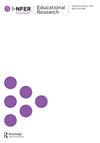合作空间:调查学生小组学习与讲师方法之间的关系
IF 2.6
3区 教育学
Q1 EDUCATION & EDUCATIONAL RESEARCH
引用次数: 0
摘要
摘要背景:促进主动学习的教学方法需要一定程度的组织重新定位。例如,为了适应以学生为中心的学习,可能需要进行结构和文化上的转变。在高等教育环境中,讲师在支持学生的协作学习方面可以发挥重要作用。讲师的教学方法与通过小组活动促进学生学习之间的联系需要更多的了解。本定性研究以主动学习为背景,探讨教师的教学方法与学生小组学习之间的关系,并探讨如何通过合作活动丰富学生的学习。方法通过对马来西亚一所高等教育机构的12名讲师进行半结构化访谈来收集数据。还对教学进行了观察。数据按主题进行分析。对丰富数据的深入分析确定了讲师通过设计和交付适当的、引人入胜的协作任务来实现和促进学生基于小组的学习的许多不同方式。从支持性和程序性信息提供方面确定了主动学习发展过程中的一些挑战。研究结果揭示了小组活动如何在精心设计的学习任务的支持下促进学生的学习,帮助学生获得必要的合作技能。更广泛地说,它们还强调了为高等教育讲师提供机构专业发展支持的必要性,以便形成一种持续的合作教学文化。关键词:小组学习;协作学习;学习任务;协作学习空间;主动学习;高等教育披露声明作者未报告潜在的利益冲突。本研究由莫纳什大学马来西亚学习和教学补助金2021 [STG-000068]支持。本文章由计算机程序翻译,如有差异,请以英文原文为准。
Collaborative spaces: investigating the relationships between students’ group-based learning and lecturers’ approaches
ABSTRACTBackground Enabling teaching approaches that promote active learning can require a certain amount of organisational reorientation. For example, structural and cultural shifts may be needed to accommodate moves towards student-centred learning. In higher education environments, lecturers can play a significant role in supporting students’ collaborative learning. More needs to be understood about the connections between lecturers’ pedagogical approaches and the enhancement of student learning through group-based activities.Purpose With the context of a journey towards active learning in mind, this qualitative study sought to explore the relationship between lecturers’ pedagogical approaches and students’ group-based learning, and consider how student learning may be enriched through collaborative activities.Method Data were collected through semi-structured interviews with 12 lecturers who were teaching a range of subjects in a higher education institution in Malaysia. Observations of teaching were also undertaken. Data were analysed thematically.Findings The in-depth analysis of rich data identified the many different ways in which lecturers enabled and promoted students’ group-based learning, through the design and delivery of appropriate and engaging collaborative tasks. Some challenges in the journey towards active learning development were identified in terms of supportive and procedural information provision.Conclusion Findings offer insight into how group activities may enhance student learning, when supported with carefully designed learning tasks which help students acquire the necessary collaborative skills. More broadly, they also highlight the need for institutional professional development support for higher education lecturers in order to engender a sustained culture of collaborative teaching and learning.KEYWORDS: Group-based learningcollaborative learninglearning taskscollaborative learning spacesactive learninghigher education AcknowledgementsThe author is grateful to all participating lecturers and research assistants.Disclosure statementNo potential conflict of interest was reported by the author(s).Additional informationFundingThe work was supported by the Monash University Malaysia Learning and Teaching Grant 2021 [STG-000068].
求助全文
通过发布文献求助,成功后即可免费获取论文全文。
去求助
来源期刊

Educational Research
EDUCATION & EDUCATIONAL RESEARCH-
CiteScore
4.00
自引率
2.90%
发文量
0
期刊介绍:
Educational Research, the journal of the National Foundation for Educational Research (NFER), was established in 1958. Drawing upon research projects in universities and research centres worldwide, it is the leading international forum for informed thinking on issues of contemporary concern in education. The journal is of interest to academics, researchers and those people concerned with mediating research findings to policy makers and practitioners. Educational Research has a broad scope and contains research studies, reviews of research, discussion pieces, short reports and book reviews in all areas of the education field.
 求助内容:
求助内容: 应助结果提醒方式:
应助结果提醒方式:


